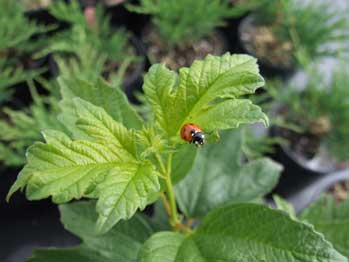Local, state, and federal regulations affect the nursery grower as they affect any business owner. Become familiar with the regulations before you make a financial commitment to enter the business.  Some of those of general interest to the nursery grower are presented here. However, there is no shortage of laws and regulations that a nursery owner must deal with.
Some of those of general interest to the nursery grower are presented here. However, there is no shortage of laws and regulations that a nursery owner must deal with.
Any Oregon citizen or business whose total sales of nursery stock exceed $250 during a fiscal year must be licensed with the State of Oregon Department of Agriculture. Nursery license fees are used to provide a nursery inspection and support program for the protection of the industry and the public. Each lot of nursery stock sold in or out of Oregon must be accompanied by an inspection certificate issued by the State Department of Agriculture, usually through a State Horticulturist. These certificates testify that the plants sold are free from pests and diseases. Quarantines are imposed on entry to Oregon of certain plants to protect the nursery and agricultural industries of the State. Quarantines prevent entrance and/or spread of serious pest and disease problems in the State.
Oregon law requires each city and county to plan and zone all lands within its jurisdiction. It does not, however, impose a uniform zone code or planning procedures upon them. The attitude of local governments toward agricultural land use (including nurseries) varies greatly. A permit to construct a building is required throughout Oregon. Building permits are issued by the county or city building inspection office. The building plan must meet the minimum standards of the county or city building code before a permit is issued. Some local governments exempt agricultural structures, but others require a permit and minimum standards for any structure.
 Federal plant quarantine laws prevent the introduction of foreign plant pests into the United States. They also restrict movements of plants, equipment, or anything else likely to carry pests from an infested or infected area to an area not infested or infected. These laws also provide for steps to be taken to eradicate the pests in the problem area. A permit is necessary to import plants, seed, cuttings, scions, and tubers from foreign countries. Post entry quarantine (supervised growing and inspection) may also be required for plants from countries known to have dangerous plant diseases that can be detected only in the growing plant.
Federal plant quarantine laws prevent the introduction of foreign plant pests into the United States. They also restrict movements of plants, equipment, or anything else likely to carry pests from an infested or infected area to an area not infested or infected. These laws also provide for steps to be taken to eradicate the pests in the problem area. A permit is necessary to import plants, seed, cuttings, scions, and tubers from foreign countries. Post entry quarantine (supervised growing and inspection) may also be required for plants from countries known to have dangerous plant diseases that can be detected only in the growing plant.
 The federal Environmental Protection Agency (EPA) requires all growers and others who apply "restricted use" pesticides to be certified. It is advisable for each grower and all employees who supervise pesticide application to become certified.
The federal Environmental Protection Agency (EPA) requires all growers and others who apply "restricted use" pesticides to be certified. It is advisable for each grower and all employees who supervise pesticide application to become certified.
